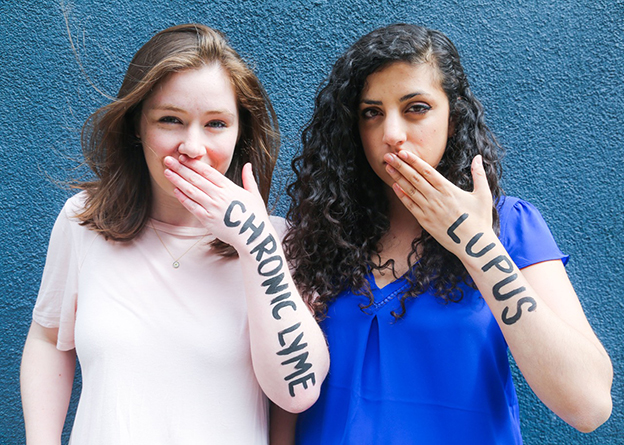Westchester County, NY
Infected: late 1990s
Diagnosed: 1998
Current Health: Getting stronger every day
The simple act of listening and sharing illness narratives is a powerful and healing force…We want to build awareness and reform the perceptions and treatments of this often silenced, chronic disease community. It’s time to make some noise. -Allie C.
When I was seven years old, I was diagnosed with Lyme disease. Seven years later, I was diagnosed with three other tick-borne diseases: babesiosis, ehrlichiosis, and bartonellosis. Throughout middle school and high school I learned what it was like to live with a chronic illness. I received over six years of oral and intravenous antibiotic therapy in an attempt to keep my symptoms under control. Yet during that time I didn’t want to share anything about my disease, even with my best friend, Erica. I kept my mouth shut, put a smile on, and talked about things other than my daily trip to the IV clinic.
Erica and I met in seventh grade at John Jay Middle School in Cross River, NY during rehearsal for our spring musical, The Pajama Game. We were fast friends, the kind of friends who told each other everything. We’d leave school, go home, and sign on to AIM to talk about the 10 minutes we’d been apart. It was a typical middle school suburban friendship, impossibly close. And as we got older, we stayed just as close. We did theater together, went to parties together, traveled, had sleepovers. There wasn’t anything that happened in high school that we didn’t know about or experience together. But through all that time, there was one thing we didn’t discuss.

Erica says that, as weird as it sounds, during that same time she already knew she would be sick. When we were growing up she always felt like something was off. She was sick more than other kids and remembers missing a lot of school. Nothing set off much of an alarm until her second year of high school when she suddenly found herself exhausted, ridden with joint pain, fevers, and extreme weakness. These were symptoms I knew. I could empathize with her, but still I didn’t say anything. We chose to ignore it.
After ruling out Lyme, Leukemia, parasites, and every other rare disease her doctors could think of, Erica saw a rheumatologist who diagnosed her with Arthritis and Fibromyalgia. But her story, and my story, weren’t over yet.
In 2009, during our senior year of high school we both experienced dramatic peaks in our illnesses – the worst that either she or I have experienced in our lives thus far. In September of that year, I was floored by my first experience with neurological Lyme disease. In the course of just a few weeks, I lost my ability to read, struggled to speak, had major lapses in my memory, and was in a number of car accidents. I could hardly walk or eat. My neurological and physical symptoms were so bad that I left school for three months to try and get healthy. Erica took over my part in the fall play while I was gone. We only spoke on the phone twice while I was on medical leave.
When I returned to school after finishing treatment and getting symptoms under control, I did my very best to pretend nothing had happened. We were back to normal, or so we thought. That April, Erica had a back spasm during rehearsal for our musical. After an ER visit, she was treated with muscle relaxants and the spasm stopped. A month later, she had another one that lasted for three weeks. She had a 103-degree fever for days, was wearing a neck brace, and couldn’t breathe when lying down. No doctor could tell her what was wrong until she saw a cardiologist who, after conducting a scan of her chest, rushed her to the hospital. The spasms were actually referred pain from the extreme inflammation of her heart and lungs that were now surrounded by an immense amount of fluid. She spent the next week at Columbia Presbyterian Hospital in New York, visited each day by the rheumatology, hematology, cardiology, and infectious disease teams who searched for a diagnosis. On her eighteenth birthday, the rheumatologist announced, with very little explanation or sensitivity, that she had Lupus.
I went to visit her the next day. I remember I bought her birthday presents in the hospital gift shop downstairs. Sitting in her hospital room, we still didn’t talk about the experience she was having, or the one I had that fall. I don’t know why, but somehow – even in the hospital – we managed to push it away. We went to college the next year, and started living our own, more separate lives. Though we both knew that chronic illness was a part those experiences, we never reached out to talk about it.
During my senior year at Bard College, in an attempt to better understand the living experience of my disease and others who suffered from it, I conducted a series of interviews with chronic Lyme patients in New York and around the world. I have since developed those interviews into a memoir, titled Suffering the Silence: Chronic Lyme Disease in an Age of Denial. My interviews revealed a complex world of suffering within the Lyme community, one informed both by the illness and by the feelings of disdain and disbelief that surround it. People shared their stories with me from their wheelchairs and hospital beds, even though many of the people closest to them did not believe they are actually ill. These people helped me find my voice, and to find the desire to raise awareness about truth of their experiences, a truth that has remained unspoken for much of our lives.
Erica and I reconnected after we graduated from college and moved to New York, and we quickly found that that suffering I found in the Lyme community was not unique to Lyme. People with chronic illness around the world feel that same silencing force – it was one we were all too familiar with. Since then we have been working together to raise awareness about the living experience of chronic illness, and the social inability to accept and understand those who live with it. We’ve learned that our story is actually a fairly typical one. Though we spent years without supporting each other in ways we wish we had, we’re making up for lost time. We’ve now learned how to talk to each other about our illnesses, and hope to bring that gift to people around the world.

The simple act of listening and sharing illness narratives has been an incredibly powerful and healing force in both of our lives, and we hope to create a space to continue to honestly and openly communicate those stories. Together, we hope our experiences will work to build awareness and reform the perception and treatment of the often silenced, chronic disease community. Visit SufferingtheSilence.com and share your story or learn from others.
It’s time to make some noise.

Woah. It’s so sad to hear what you have been through. Being a kid I understand that each day something strange might happen to my body, and you give me courage to keep going. Life Is Tough.